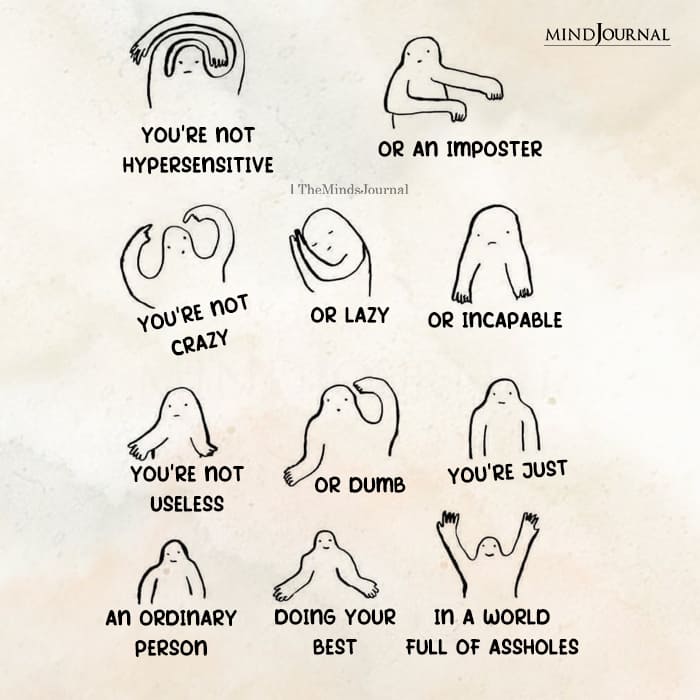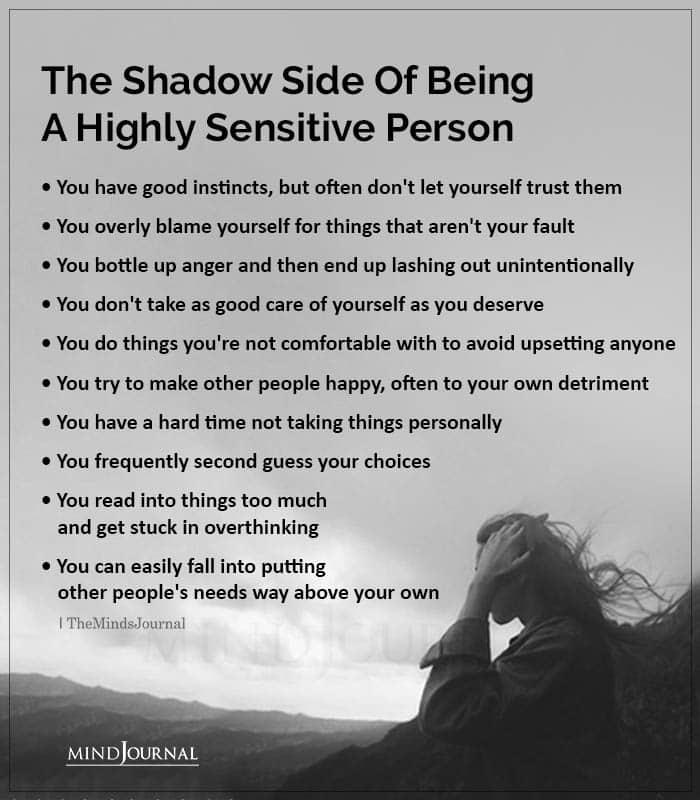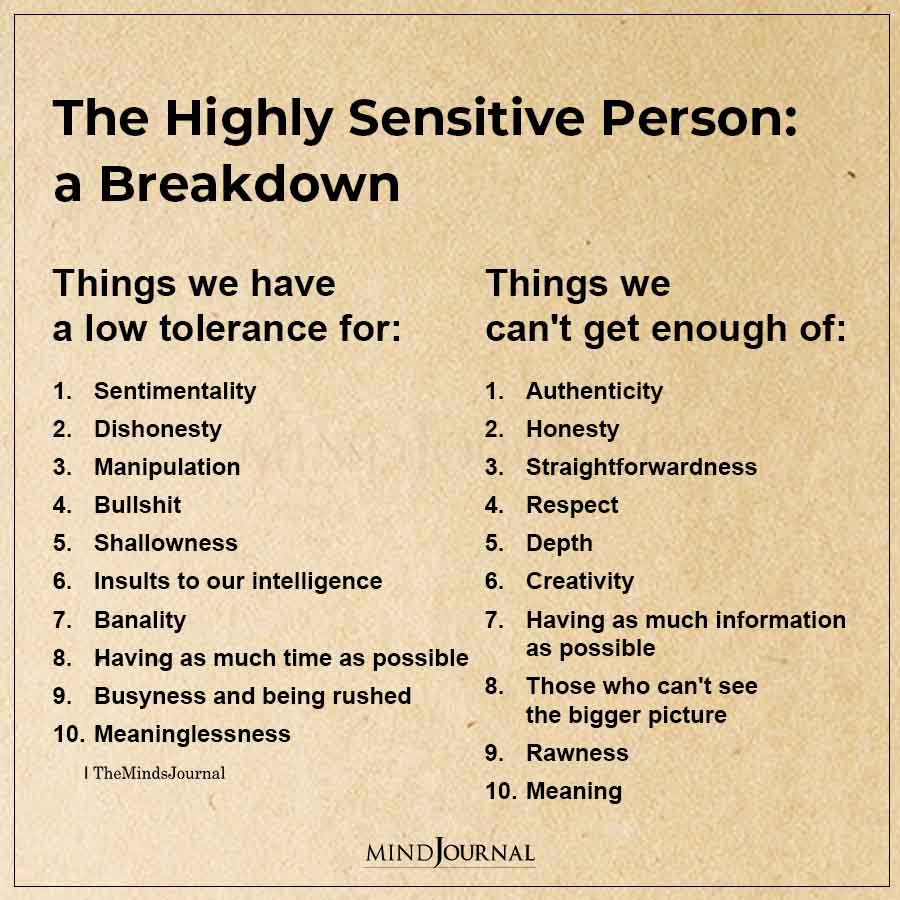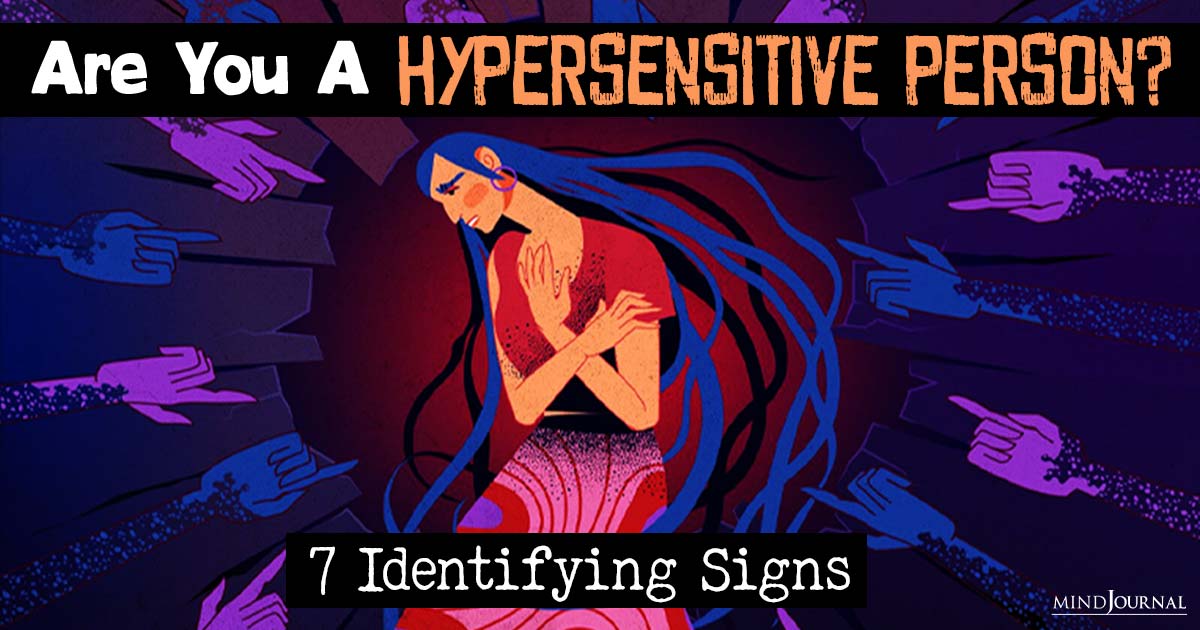Have you ever been called “overly sensitive”? Do you become emotional easily? Can you feel others’ emotions instinctively? Then you just might be a hypersensitive person. But how can you be sure if you are one? And what can you do to make life easier for you? Let’s find out.
What is a hypersensitive person?
Hypersensitive person meaning: A hyper-sensitive person is someone who is highly sensitive to emotional, physical, or environmental stimuli.
They feel things intensely and may be more easily overwhelmed by sensory input, criticism, or changes in their environment. This heightened sensitivity can make them more reactive to situations and events that others may find tolerable.
Hypersensitivity can be a trait that some people are born with, or it can develop as a result of life experiences. Hypersensitivity can manifest in a variety of ways, such as –
- Heightened emotional reactions
- Physical sensitivity to touch or pain
- Strong reactions to certain sounds, smells, or textures
- Feeling easily overwhelmed
- Having a low threshold for stress or anxiety
- Being prone to overthinking
- Experiencing intense emotions
Hypersensitivity is a complex trait and it can have both positive and negative aspects. On the positive side, hypersensitive people have a greater capacity for empathy, and be more creative and imaginative. They often have a deep appreciation for beauty, art, and music.
However, there are also some challenges associated with hypersensitivity, such as being easily overwhelmed by sensory input, feeling anxious or stressed in new or unpredictable situations, and being more susceptible to emotional or physical pain.
It’s essential to note that being emotionally hypersensitive is a common trait, but it is not a mental health disorder in itself. However, it can be a symptom with certain conditions such as anxiety, depression, post-traumatic stress disorder (PTSD) and autism spectrum disorder.
If you are concerned about your level of sensitivity or how it is affecting your life, it may be helpful to speak with a mental health professional.
Related: The 8 Types Of Highly Sensitive Person (HSP): What Type Are You?
Traits of a hypersensitive person
Here are some of the most common traits of a hyper-sensitive person:
1. Emotional intensity
They tend to feel emotions deeply and intensely. They may feel deeply moved by art, music, or nature, but they may also be more prone to anxiety, sadness, or anger.
2. Empathy
Hypersensitive people are often highly empathetic and attuned to the emotions of others. They may sense when someone is upset or struggling, even if that person is not expressing their emotions outwardly.
They may not only pick up on the emotional states of others, but also be more affected by others’ emotions
3. Perfectionism
They may have high standards for themselves and others and can be easily disappointed if they do not meet these standards. They may also be highly self-critical, and may struggle with feelings of inadequacy or self-doubt.
4. Overthinking
Hyper sensitive people may spend a lot of time overanalyzing their own thoughts and feelings, as well as those of others, which can lead to excessive worry or anxiety.
They may be prone to rumination or worrying, and may have difficulty letting go of negative experiences.
5. Sensory sensitivity
They may be more sensitive to sensory input, such as loud noises, bright lights, strong smells or certain textures. They may also be more sensitive to physical pain, and may have difficulty tolerating certain medical procedures or treatments.
6. Avoidance
Due to their sensitivity, they may avoid situations or people that they perceive as overwhelming or stressful. Hence, they may avoid social gatherings and isolate themselves, leading to loneliness.
7. Creativity
Many hypersensitive individuals have a deep appreciation for beauty and art and may have a creative outlet for expressing their emotions. They are highly creative and imaginative, and may excel in fields such as art, music, or writing.
They may also be drawn to careers in helping professions, such as counseling or social work.
It’s important to note that not all hypersensitive people will exhibit all of these traits, and that hypersensitivity can manifest in many different ways.
Related: 16 Traits Of A Highly Sensitive Person, According To Research
Symptoms of an hyper sensitive person
Let’s take a quick look at some easily identifiable hyper sensitive person symptoms that you should know about –
- Easily overwhelmed by emotions or stress
- Intense emotional reactions to stimuli or changes in environment
- Tendency to be hyper sensitive to criticism or take feedback personally
- High levels of empathy and compassion for others
- Tendency to withdraw or avoid overwhelming or stressful situations
- Perfectionism and high self-expectations
- Difficulty setting boundaries and saying no
- Strong desire for meaning and purpose in life
- Tendency to be introspective and self-reflective
- Strong connection to nature or the arts
- Difficulty with sleep and insomnia
- Strong need for validation and approval from others
- Self-consciousness and a tendency to feel judged by others
- Fear of rejection or abandonment
- Physical symptoms such as headaches, muscle tension, or gastrointestinal distress in response to stress or stimuli

Hypersensitive person vs highly sensitive person
The terms “hypersensitive” and “highly sensitive” are often used interchangeably, but there is a subtle difference in their meanings. Let us understand the difference between being hypersensitive and being highly sensitive –
1. Hyper-sensitive person
They are highly sensitive to emotional, physical, or environmental stimuli, which often results in a negative or overwhelming response. They may feel things more intensely than others, and may be more easily overwhelmed by sensory input, criticism, or changes in their environment.
Hypersensitivity can manifest in many different ways, including heightened emotional reactions, physical sensitivity to touch or pain, and strong reactions to certain sounds, smells, or textures.
2. Highly sensitive person
A highly sensitive person is someone who has a heightened sensitivity to stimuli but may not necessarily experience distress or interference in daily life.
Highly sensitive individuals may have a more intense reaction to sensory stimuli, emotions, and social situations, but they can also be deeply empathetic, creative, and intuitive.
Related: 20 Things You Do Differently Because You’re A Highly Sensitive Person
Are they similar or different?
While both terms describe a heightened sensitivity, “hypersensitive” typically carries a negative connotation, while “highly sensitive” is more neutral or even positive.
Hypersensitivity can be seen as an extreme form of sensitivity that causes distress or interference in daily life, while high sensitivity is a more nuanced trait that can be both positive and negative depending on how it is managed.
It’s important to note that both hypersensitivity and high sensitivity are not disorders, but rather traits that exist on a spectrum and are part of an individual’s unique temperament.
Understanding and embracing one’s level of sensitivity can help a person navigate the world more effectively and find ways to manage any challenges that come with it.
Can you be both a hypersensitive person and a highly sensitive person?
Yes, it is possible for someone to be both hypersensitive and highly sensitive. In fact, the two traits often coexist in the same person to some degree, as both involve a heightened sensitivity to stimuli.
Some people who are hypersensitive may also be highly sensitive. However, these two traits are not the same thing and can manifest in different ways.
For instance, a person may have a hypersensitive response to specific stimuli, such as loud noises or bright lights, while also being highly sensitive to other types of stimuli, such as emotional cues or social dynamics.
They may also have a strong emotional response to certain situations or events while having a heightened appreciation for art or music.
Hypersensitivity is generally characterized by a negative or overwhelming response to stimuli, while high sensitivity is more neutral or positive.
But you may experience both positive and negative responses to stimuli, depending on the context and your individual traits and experiences.
It’s important to note that everyone’s level of sensitivity is unique, and some people may experience hypersensitivity or high sensitivity to a greater degree than others.

How to cope with hypersensitivity
There are several coping strategies that can be helpful for dealing with hypersensitivity in your everyday life:
1. Engage in creative activities
Creative activities such as painting, writing, or playing music can be a great outlet for expressing and processing emotions.
2. Mindfulness and relaxation techniques
Practicing mindfulness meditation or deep breathing exercises can help you become more aware of your thoughts and emotions, and learn to regulate them effectively.
3. Setting boundaries
Learning to set and enforce healthy boundaries with others can help you avoid situations that trigger your hypersensitivity.
4. Self-care
Engaging in regular self-care activities, such as exercise, healthy eating, and getting enough sleep, can help you better manage stress and reduce your overall level of sensitivity.
5. Practice self-compassion
Be kind and gentle with yourself, and avoid self-criticism or negative self-talk. Remind yourself that it’s okay to feel sensitive, and that you are doing the best you can. Embrace your imperfections.
6. Try grounding techniques
Grounding techniques involve using your senses to connect with the present moment and reduce feelings of overwhelm. For example, you could focus on the sensation of your feet on the ground, or the texture of an object in your hands.
7. Use positive affirmations
Affirmations are statements that help promote positive self-talk and challenge negative thoughts. Repeat phrases like “I am strong” or “I am worthy” to yourself whenever you’re feeling hypersensitive.
8. Seek support from others
Talk to a trusted friend or family member about your feelings, or consider joining a support group for people with similar experiences.
9. Seeking professional help
If your hypersensitivity is significantly impacting your daily life or causing significant distress, it may be helpful to seek the guidance of a mental health professional who can provide additional support and guidance.
Related: 5 Great Lessons A Highly Sensitive Person Needs To Learn
10. Seek therapy
Cognitive-behavioral therapy (CBT) is a type of talk therapy that can help you identify and challenge negative thought patterns and beliefs that may be contributing to your hypersensitivity.
Remember that coping with hypersensitivity can be a process, and it’s okay to seek help and support when you need it. It’s also important to note that different strategies may work better for different people, and it may take some trial and error to find the approaches that work best for you.
How to help a loved one who is hypersensitive
If you have a friend or family member who is hypersensitive, here are some ways you can support them:
1. Validate their feelings
Let them know that their feelings and experiences are valid and real. Avoid dismissing or minimizing their emotions.
2. Practice active listening
Listen attentively to what they have to say, without interrupting or offering advice unless asked. Show empathy and understanding.
3. Be patient
Hypersensitive people may need more time to process their emotions and thoughts. Be patient and avoid rushing them.
4. Respect their boundaries
They may need more personal space and time to themselves. Respect their boundaries and avoid taking things personally if they need some time alone.
5. Offer practical support
Offer to help with tasks or responsibilities that may be overwhelming for them. This can help them better cope with stress and anxiety.
6. Encourage self-care
Suggest activities that promote self-care, such as meditation, yoga, or exercise.
7. Avoid criticism
Avoid criticizing or blaming them for their sensitivity. Instead, offer support and encouragement.
Related: 7 Tips To Deal With Emotional Flooding For Highly Sensitive People
8. Educate yourself
Learn more about hypersensitivity and the challenges it can bring. This can help you understand their experiences better and offer more effective support.
9. Have a positive attitude
Offer positive reinforcement and feedback whenever possible. Encourage them to focus on their strengths and achievements.
10. Encourage them to seek professional help
If their hypersensitivity is interfering with their daily life, encourage them to seek professional help from a therapist or other mental health professional, if needed.

Accept your sensitivity
Being a hypersensitive person can be challenging, but it’s important to remember that it’s a unique trait that comes with its own strengths and weaknesses. A hypersensitive person has a heightened capacity for empathy, creativity, and emotional awareness.
However, they may struggle with overstimulation, anxiety, and coping with stressful situations. Hypersensitivity is not a mental health disorder, but it can lead to emotional and physical distress if not properly managed.
Seeking professional help from a therapist or counselor can be a valuable tool in learning how to cope with hypersensitivity and developing effective strategies for managing stress and emotions.
Ultimately, hypersensitivity is a natural and valid aspect of human experience. By understanding, embracing and learning to manage it, you can cultivate a fulfilling and meaningful life that honors your unique sensitivities and strengths.
Related: How To Thrive As A Highly Sensitive Person
Frequently Asked Questions (FAQs):
Who is hypersensitive narcissist?
A hypersensitive narcissist is a type of narcissist who is overly reactive to criticism or perceived slights, while still exhibiting the typical self-centered behavior and lack of empathy associated with narcissism.
What is the difference between Hypersensitivity and Hyposensitivity?
Hypersensitivity refers to an exaggerated or intense response to stimuli, while hyposensitivity refers to a decreased or muted response. Both can affect sensory, emotional, and social processing, and may impact daily functioning.
What is hypersensitive personality disorder?
There is no official diagnosis of hypersensitive personality disorder, but it may refer to individuals who exhibit chronic and intense emotional sensitivity and reactivity to stimuli, which can impact daily life.











Leave a Reply